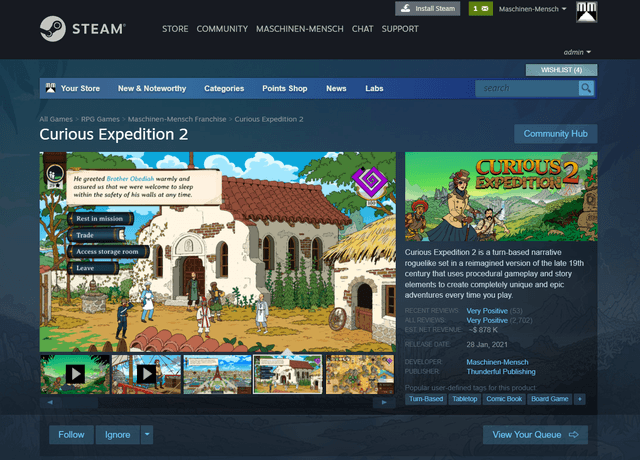
Gonçalo is the Head of Marketing at Codecks. He’s a big Pokémon fan (he has a tiny Bulbasaur right next to his work computer and a big Psyduck in his living room), still raves frequently about how much he loved Shadow of the Colossus (it’s been almost 20 years, Gonçalo!), and truly believes Codecks is *the* tool to turn ideas into videogames.
Codecks is a project management tool inspired by collectible card games. Sounds interesting? Check out our homepage for more information.
Navigating the EU Ecosystem for Indie Gaming: Getting Your Game Funded

All great games (or movies, or songs, or…) started as an idea, and the art of turning ideas into games is one that’s never been as evolved as it is now. Gaming has never, thankfully, been this diverse: these days, games are made in all sorts of ways by all sorts of people, from the biggest teams to the smallest, resulting in all sorts of games! Here at Codecks, we work with teams of all sizes—from solo developers to bigger studios, spread all around the world. Codecks itself was created for that, too: a project management tool for and by game developers that can be used by any team, no matter their setup. Many of the teams using our tool, however, are definitely more on the indie side: smaller and scrappier, making the more innovative, original, and unique games out there. And many of them are also, like us, EU-born and based.
Making games isn’t easy—nor cheap. Making a game means spending months or years working on something not knowing if it’ll be successful or not, having to sustain that work (and your livelihood!) all the way until the game is ready and released. After all, you can’t live off ideas, and making games is still work—work that, particularly if you’re solo or in a small team, can be as taxing on your soul as on your wallet. Thankfully, these days there are more and more ways and systems created to give game developers the support they need to make their games a reality. And many of them, thankfully, are here in the EU.
The European indie gaming scene these days is booming, having grown exponentially in most EU countries in the last few years (Italy saw a 50% increase in game developers from 2021 to 2022, for example), with more to come: by 2030, the industry is expected to have doubled its revenue, exceeding €40 billion. All this also brings more opportunities than ever for developers to bring their visions to life, with the EU now valuing the industry more than ever. After all, creating a game isn’t just about passion, or about having good ideas: it’s also about funding and resources. As you might’ve heard, we recently got a EU grant ourselves, bringing our funding to a total of €1 million (you might’ve read about it in a few different places). This grant will allow us to grow and expand Codecks more than ever—and now, after having gone through the process, we want to share with game developers out there how they can do the same and get their game funded too. Our mission is, after all, to help turn (your) ideas into games–and that involves not just creating the best project managing tool to make it happen, but also sharing whatever knowledge we have that might help.
In this post, we’ll explore how the EU ecosystem supports indie game developers, the types of funding and institutions available, and how to navigate the process. By the end of it, you’ll hopefully have a better idea about the different support mechanisms that can help you–bringing you closer to making your game a reality. So, let’s get started!
The Growing Indie Gaming Scene in Europe
Indie games have created their own universe in the gaming world, offering fresh and creative experiences that can cater to any player’s specific interests. These days, even a niche game can break through—the world doesn’t just belong to the AAAs or big studios anymore. In Europe, this indie movement is thriving thanks to a strong network of institutions that support cultural and technological innovation, hoping to make the EU a lighthouse within the industry.
Many of the games you’ve played probably benefited from EU funding, including some of the biggest ones out there—such as The Witcher 3, Little Nightmares, Life is Strange, Hellblade: Senua’s Sacrifice, This War of Mine, and many, many more. These games show not just the prevalence of EU funding in the industry, but also how games that are funded can break through and achieve success.
But for that to happen, and in order to get your game funded, it’s important to understand how the system works.

Understanding the EU Ecosystem for Indie Gaming
Europe has always been an example when it comes to fostering creative industries (stay for the credits next time you go to the movies, and get ready for a long list of EU institutions at the end), and gaming is no exception. From EU-wide programs to local grants, there’s a wealth of funding opportunities to explore—many of them created specifically for gaming and game developers. These grants are given by specific institutions and programs, which have different types of support available, too.
Some Key Institutions:
- Creative Europe: The big one! This is an EU institution focused on cultural and creative projects, including games. This was the one that gave us our grant!
- National and Regional Organizations: Institutions like Medienboard Berlin-Brandenburg in Germany, the CNC in France, and many others provide localized support for developers. If you’re in the EU, we really recommend checking out which support is available to you in your specific region or country.
- Research and Innovation Initiatives: Horizon Europe or EIT Digital programs, for example, encourage technological advancements in gaming–which can include your game, too!
Types of Support Available
We’ve talked about funding a bit already, but… what does getting funded mean, exactly? Well, with these institutions, funding can take many forms, such as direct grants, tax incentives, or subsidies for specific aspects of development like prototyping or marketing. It all depends on each one, the state of your game (do you have a prototype already, for example?), and more. But there are, thankfully, options specifically for indie developers and their games.
Funding Options for Indie Developers in the EU
European-Wide Programs
The EU’s flagship initiative for creatives, the already-mentioned Creative Europe, offers funding specifically tailored to innovative and culturally significant games. Eligible projects can secure up to a six-figure sum in support, making it a total game-changer (literally) for indie developers.
Another notable option is Horizon Europe, which we also already mentioned, which focuses on research-driven innovation, ideal for games with groundbreaking technology or unique mechanics. There’s many more, however, like Interreg Europe, the Digital Europe Programme, European Games Developer Federation (EGDF) initiatives, and more!
Country-Specific Programs
Countries across the EU also have their own funding options, such as:
- Medienboard Berlin-Brandenburg (Germany): Provides funding for projects that contribute to the local gaming industry in… you guessed it, Berlin-Brandenburg.
- CNC (France): Offers financial support for video game creation and innovation, along with other help such as tax credits for video game companies.
- The Finnish Film Foundation (Finland): Supports the development of digital games that have a cultural or educational element. While the foundation is primarily focused on films, it also provides funding for game projects that contribute to the Finnish cultural landscape.
- Vlaams Audiovisueel Fonds - VAF (Belgium): The VAF supports game developers in Flanders with funding for projects that push boundaries in interactive storytelling and design. It also focuses on projects that involve cross-media collaborations (such as games with film or VR components).
And there are many, many more!
Regional and Local Support
In addition to national funding, many regions have their own initiatives. For instance, Bavaria in Germany has FFF Bayern, Wallonia in Belgium has Wallimage, and Catalonia has Videojocs Catalonia. Looking at specific support not just from your country but also your specific region can be very helpful!
Found Your Grant? Next Step: Applying
Once you decide on a grant, you then have to apply—following strict deadlines and conditions that change according to each institution. This part can be nerve-wracking (believe us, we know…), so here are a few things to keep in mind:
- Understand the Criteria: Tailor your application to match the funder’s goals. For example, Creative Europe emphasizes cultural significance, while Horizon Europe values innovation, so applications would be different for each.
- Tell a Compelling Story: Showcase how your game aligns with current trends or fills a gap in the market. Show them why you believe your game will be successful, and how that success will happen.
- Leverage Your Network: Collaborate with studios or individuals who have experience navigating funding applications. Ask for help from the community!
- Be Thorough: Provide detailed budgets, prototypes (if you have them!), and a clear development roadmap. Be as detailed as you humanly can. Get ready to prepare some very, very long documents.
Conclusion
If you’re a game developer in the EU, no matter how big or small your team or how big or small your game, the ecosystem offers several opportunities to help you make your game. By exploring these grants and institutions, you can find the support you need and actually get to transform your idea into an actual, playable game.
So… what are you waiting for? Go ahead and see what help any of these institutions can give you! Feel free to reach out to us using the form below if you have any questions—we’re happy to help. Already working on your game? Curious to learn exactly why so many studios are using Codecks? Then sign up now!


